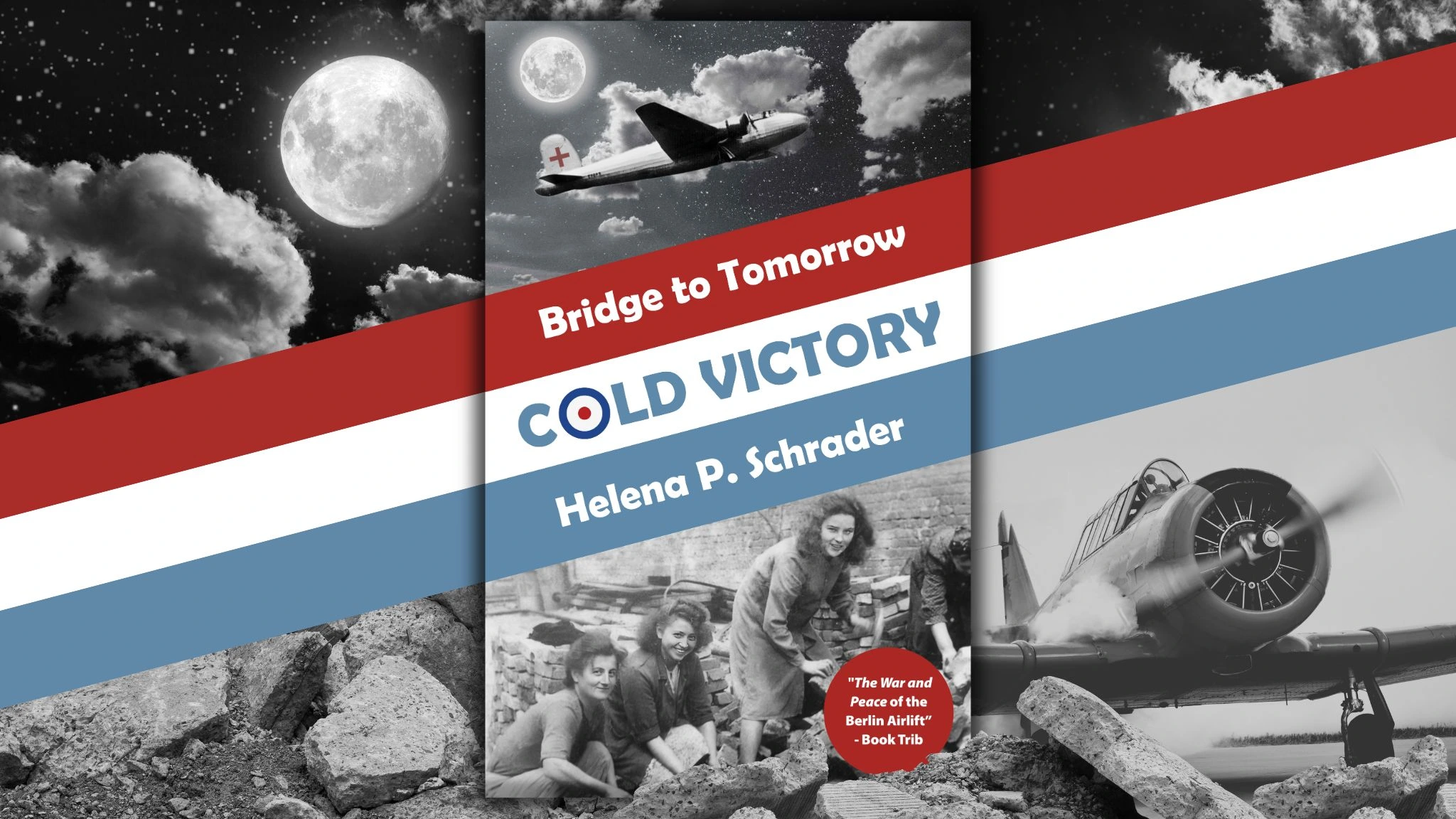Cold Victory: A Novel of the Berlin Airlift by Helena P. Schrader
Set in the shadow of World War II during the Berlin Airlift, this sweeping, character-rich work brings the past into sharp focus — not just in terms of facts and figures, but in the emotional stakes of those who endured one of the Cold War’s earliest and most decisive confrontations. The result is a moving, deeply human story about standing firm against tyranny without lifting a weapon, and about what it means to win peace, not just survive war.
Though it’s the third book in Helena P. Schrader’s Bridge to Tomorrow series, Cold Victory can be appreciated entirely on its own. It opens in December 1948, when the Soviet Union’s blockade of West Berlin has plunged the city into crisis. Trains and trucks have been halted. Electricity has been cut. Food and fuel are scarce. Over two million people — most of them civilians — rely solely on the Allied Airlift to survive. Into this tense and fragile setting, Schrader drops a full cast of characters: British and American military personnel, German civilians, political leaders, translators, air traffic controllers and even a few double agents.
What follows is a complex mosaic of personal and political storylines, told with unhurried clarity and grounded in extensive historical research. While some historical fiction leans on melodrama to make its point, Schrader’s approach is subtler. Her writing is emotionally grounded and meticulously observed, with just the right balance of tension and reflection to keep the pages turning. You’re not just reading about history — you’re inside it.
A City Under Siege, A People Holding On
The Berlin of Cold Victory is a city of hushed desperation, exhausted resilience and occasional — almost shocking — bursts of hope. Coal is rationed, food rations are skeletal and frost creeps across the walls of unheated apartments. For Berliners like Charlotte Walmsdorf, a traumatized journalist with a past she can barely speak of, every day is a psychological test. Others, like city councilman Jakob Liebherr or attorney Alix von Feldburg, face moral battles as they try to preserve the rule of law against Soviet manipulation and fascist remnants alike.
And yet, Berlin is also a place of fierce determination. The air crews, traffic controllers and logistical planners who keep the Airlift running are not merely performing heroic feats — they are improvising a new kind of warfare, one based not on bombs, but on food, medicine and fuel. That inversion of wartime values gives Cold Victory a unique moral texture. This is a novel about ordinary people doing extraordinary things not out of glory, but necessity and belief in something greater than themselves.
A Chorus of Voices, All Worth Hearing
Schrader juggles a large ensemble cast, and remarkably, no voice feels like filler. Through alternating perspectives, she gives readers access to the inner lives of pilots, diplomats, schoolteachers, nurses, lawyers, engineers — and yes, a few spies. British Wing Commander Robin Priestman is a standout: principled, private and ultimately self-sacrificing. His wife Emily, a former ferry pilot turned air ambulance captain, is both his anchor and an independent force of her own. Their marriage, tested by war, bureaucracy and shifting alliances, serves as an emotional through-line that ties together many of the novel’s most affecting scenes.
Meanwhile, characters like Galyna, a Ukrainian-born translator facing pressure from Soviet agents, and Jasha, a former forced laborer trying to reclaim dignity through love, offer a wider lens on how geopolitics filters down to deeply personal consequences. These are not archetypes; they are people with messy histories, layered motivations and private griefs. Even side characters — from idealistic Berlin teenagers to wary American co-pilots — feel fully drawn. One of Schrader’s greatest gifts is that she writes from the inside out, giving each character their own rhythm, register and interior logic.
And perhaps most crucially, Schrader doesn’t relegate her female characters to the sidelines of history. They are center stage here — not in grand gestures, but in daily acts of defiance and endurance. Whether it’s organizing child evacuations, conducting complex legal defenses in a still-fractured justice system or literally flying through storms to deliver medical aid, the women of Cold Victory are indispensable to its story. Their strength, often quiet but never passive, gives this novel much of its soul.
The Personal Is Political
One of the most compelling aspects of Cold Victory is how Schrader captures the intimate cost of political decisions. The vote of Berlin’s civilian population, the reestablishment of civil courts and the acts of sabotage or resistance on either side of the Iron Curtain are never abstract. They unfold through characters forced to reckon with what justice means when institutions are still being rebuilt, and what freedom looks like when simply surviving winter is a daily challenge.
There are courtroom scenes that pulse with tension, not because they are sensationalized, but because the stakes are so heartbreakingly real. A key subplot involves a rape victim accused of murder — and the women (from various walks of life) who rally to her defense. This story, grounded in compassion and resilience, resonates with surprising timeliness, underscoring how the fight for justice is always ongoing, always unfinished.
Elsewhere, a dramatic rescue of a downed aircrew behind Soviet lines adds momentum and suspense, while other scenes quietly chip away at ideological certainty. Former Nazis, Soviet loyalists, and disillusioned citizens all share the page — but never simplistically. Schrader treats her antagonists not as villains, but as products of their own warped loyalties and fears. That nuance allows Cold Victory to do something rare: it challenges without preaching and empathizes without excusing.
History in All Its Texture
It’s clear that Helena Schrader has done her homework — and then some. With a PhD in history and a career in diplomacy, she brings both factual precision and narrative insight to the table. The logistics of the Airlift, the design of aircraft, the structure of Allied command, even the nuances of early Cold War propaganda — all are presented with fidelity and confidence. But where Cold Victory really shines is in how seamlessly these facts are embedded into the emotional and sensory world of its characters. You never feel like you’re being lectured; instead, you’re living through history with people who don’t yet know how it will end.
The writing itself is lucid and restrained, with flashes of dry wit and lyrical clarity. Schrader avoids purple prose in favor of a clean, observant style that lets the drama emerge organically. There are no forced revelations or tidy resolutions. Life in Cold Victory is complicated. Progress is halting. But courage, small and sustained, adds up to something undeniable.
A Story That Lingers
By the final chapters, the book’s title becomes more than a clever metaphor. The “cold victory” of the Berlin Airlift is not a clean-cut triumph. It’s a win paid for with frostbitten fingers, sleepless nights and political brinkmanship. And yet it is a victory — not only for the Allies who refused to back down, but for the Berliners who chose to believe that dignity was worth hardship, that freedom could outlast fear.
This novel doesn’t end with fanfare, but with something better: the quiet understanding that history is shaped by those who stay, who speak up, who keep flying. It’s hard to read Cold Victory without feeling both sobered by what was endured and stirred by what was achieved.
If you’re drawn to historical fiction that respects the complexity of its era, that puts people before politics, and that offers not only insight but emotional resonance, Cold Victory is a must-read. It rewards close attention but never feels like homework. It challenges your assumptions without making you feel lost. And most importantly, it tells a story that feels both necessary and deeply human.
Helena P. Schrader has crafted something special here — a novel that reminds us, in the best tradition of the genre, that history is never just in the past. It lives on in stories like this one, in the questions we still ask, and in the lives of characters who refuse to be forgotten.
For readers who crave intelligence over sensationalism, heart over spectacle, and the kind of book that leaves a lasting impression, Cold Victory delivers — and then some.
About Helena P. Schrader:

Award-Winning and Best-Selling Historical Novelist
Author of 26 Historical Fiction and Non-Fiction Titles, Winner of numerous literary accolades
For readers tired of clichés and cartoons, award-winning novelist Helena P. Schrader offers nuanced insight into historical events and figures based on sound research and an understanding of human nature. Helena’s chief areas of expertise are Aviation, the Second World War, Ancient Sparta, and the Crusader States.
The first book in her three-part Bridge to Tomorrow series, Cold Peace, won six literary accolades including Gold for Military Fiction in the Historical Fiction Company’s 2023 Book Awards, Gold in the 2024 Feathered Quill Awards, runner-up for the Historical Fiction Company’s prestigious Book of the Year award in 2023, an Indie BRAG medallion and a Maincrest Media Award.
Helena holds a PhD in history from the University of Hamburg, which she earned with a ground-breaking biography of a leader of the German Resistance to Hitler, and served as an American diplomat in Europe and Africa. She grew up sailing the Maine coast, was a passionate horsewoman, and is now retired and living with her husband and two dogs.




